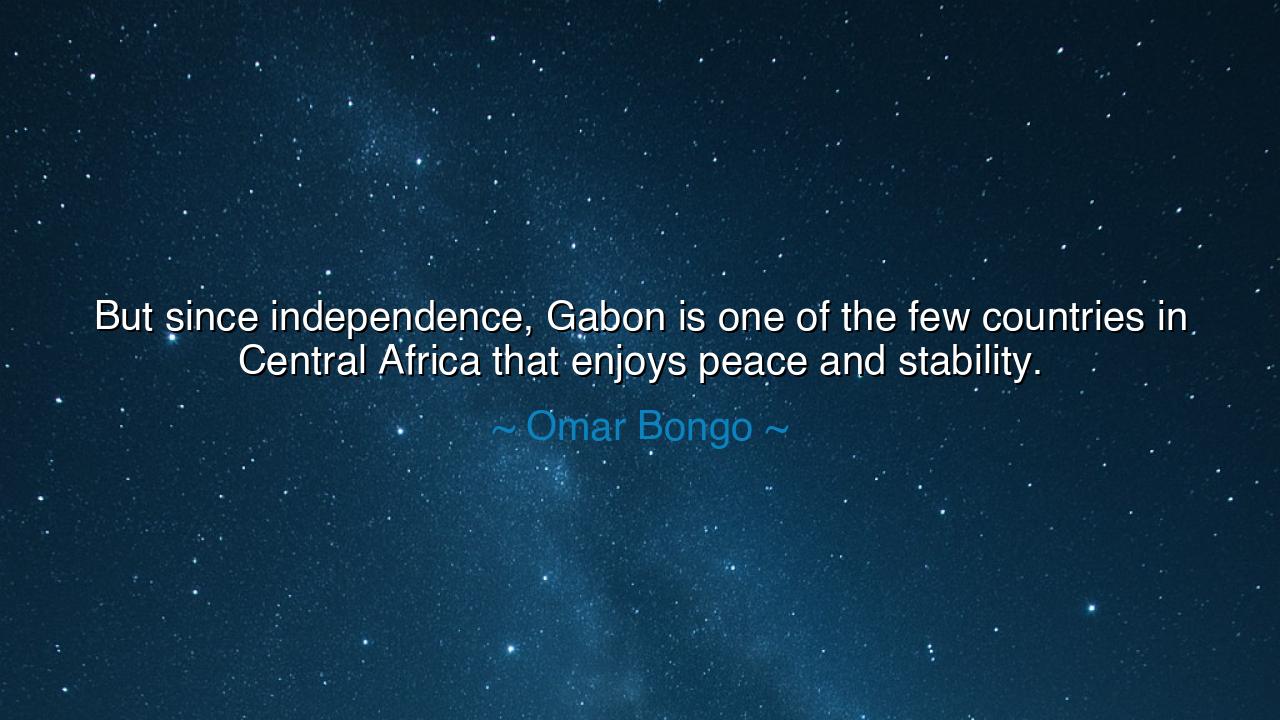
But since independence, Gabon is one of the few countries in
But since independence, Gabon is one of the few countries in Central Africa that enjoys peace and stability.






Hear the words of Omar Bongo, the long-serving leader of Gabon, who once proclaimed with pride and gravity: “But since independence, Gabon is one of the few countries in Central Africa that enjoys peace and stability.” These words carry both the calm of triumph and the weight of history. For they were spoken by one who stood upon the threshold between two worlds — the world of colonial domination and the uncertain dawn of self-rule. In them, Bongo speaks not merely of his nation’s condition, but of the rare and precious virtue of peace, a virtue often more difficult to win and preserve than war itself.
To understand his meaning, one must remember the time from which his words arose. In 1960, Gabon, like many African nations, gained its independence from France. Across the continent, drums of liberation beat loudly, and hopes soared high. Yet with freedom came the storms of power — civil wars, coups, rivalries, and the heavy hand of foreign influence. The newly freed nations were like young trees facing their first tempests: strong in spirit, but fragile in their roots. Amidst this upheaval, Gabon stood out as a quiet island — a land where the fires of conflict did not consume the fields of promise. And in this calm, Bongo saw not mere fortune, but the fruit of stability, a blessing to be cherished.
In the ancient world, philosophers often said that peace is the greatest victory — for it requires more wisdom than war. To build peace is to master not others, but oneself. Bongo’s words echo this eternal truth. He recognized that the preservation of harmony in a nation as diverse as Gabon — rich in resources, languages, and faiths — was a feat of leadership and collective will. For peace does not mean the absence of conflict; it means the triumph of balance over chaos, of dialogue over destruction. It is the art of holding together what would otherwise break apart.
Consider the story of Ashoka the Great, the Indian emperor who, after years of conquest, turned away from the sword to embrace the path of peace. His realm flourished, not through fear, but through the discipline of compassion. Like Ashoka, Bongo too saw that the destiny of his nation lay not in endless struggle, but in continuity, order, and the steady hand of governance. Whether his rule was perfect or flawed, his belief in stability reflected an ancient wisdom: that a people cannot build, learn, or thrive when they are at war with themselves.
Yet we must not mistake Bongo’s declaration for self-congratulation alone. Beneath his words lies a subtle warning — that peace, once taken for granted, begins to fade. For true peace is not the silence of oppression, nor the stillness of stagnation, but the living harmony of justice, opportunity, and respect. A nation may appear calm on the surface, yet beneath may stir the unrest of inequality or neglect. Thus, Bongo’s statement calls not for complacency, but for vigilance. The independence of Gabon — and of any people — must be renewed each day through fairness, unity, and moral strength.
The lesson, then, is clear: stability is a seed that must be tended, not assumed. The ancients taught that harmony in the household leads to harmony in the city, and harmony in the city to harmony in the realm. So too must each citizen be a guardian of peace — in their words, in their dealings, in their hearts. For nations do not crumble first in battlefields, but in the hearts of their people, when greed, hatred, or indifference take root.
Therefore, my children, remember Omar Bongo’s words not merely as the boast of a ruler, but as a call to wisdom. To preserve peace is the noblest labor of any people. Treasure your independence, not as a trophy, but as a responsibility. Build communities that listen before they judge, leaders who serve before they command, and citizens who unite before they divide. For the true measure of a nation is not its wealth, nor its armies, but the peace that dwells within its borders and within its spirit.
Thus, as the ancients would say, may every generation renew the covenant of harmony — that the gift of stability may endure beyond the life of any ruler, and that the flame of independence, once lit, may never again be darkened by the shadows of discord.






AAdministratorAdministrator
Welcome, honored guests. Please leave a comment, we will respond soon